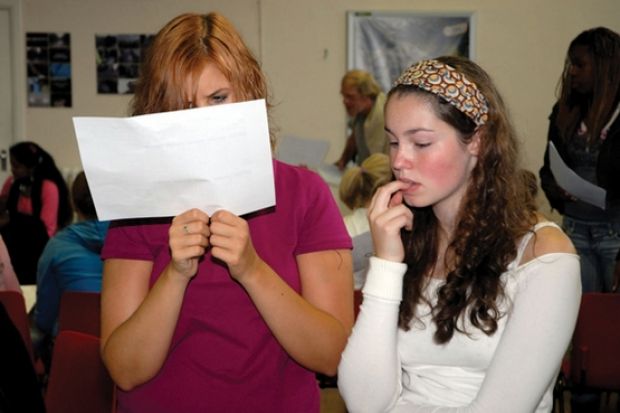Much of the surge in demand for university places in England in recent years has been driven by applicants without standard qualifications such as A levels, according to a report.
The study, published on 3 February by the Higher Education Policy Institute, shows that people with no "tariff points" accounted for nearly half the rise in applications through the Universities and Colleges Admissions Service from 2008 to 2010.
More than 200,000 applicants from England last year fell into the category, with 126,000 gaining places - more than a third of those entering higher education.
The figure casts doubt on the viability of Lord Browne of Madingley's proposal to use tariff points to restrict student numbers.
The study, Higher Education Supply and Demand to 2020, draws on Ucas data and other statistics to explain recent trends in applications and consider what they could mean over the next nine years.
It concludes that if demographic change were the only factor, applications would fall by 2.8 per cent, but "considerable latent demand" in the system will outstrip this and worsen the mismatch with supply.
As a result, the report predicts, the number of students from England missing out on university places despite having the ability to enter higher education could top 100,000 by the end of the decade - up from 62,000 last year.
One key factor is expected to be the rise in the compulsory school- and college-leaving age to 18, which will take effect in 2015.
Bahram Bekhradnia, director of Hepi, warned that with demand outstripping supply, the government will continue to come under pressure to increase university places without adding to the taxpayer's burden.
"The government will try to meet that demand because it has big political problems if it doesn't. One way of doing it is by reducing the cost to itself by increasing the cost to students," he said.
Mr Bekhradnia added that the finding on Ucas tariff points was "remarkable" but difficult to analyse because the characteristics of the group were so diverse.
Many will simply hold qualifications outside the Ucas tariff scheme, the report says, but it was also "reasonable to suggest" that a good number are "able people who left school with few qualifications and are seeking to improve their life chances".
Ucas statistics not included in the report show that in 2009, more than a fifth of applicants with no tariff points were seeking places on nursing or social work courses.
Hepi's study comes just days after the latest Ucas figures showed that applications to university this year had risen by 5 per cent.
This was not as high as some had predicted in the final year before fees rise and was lower than the 20 per cent increase last year.
Thames Valley University recorded the biggest increase of any publicly funded university, with numbers up 47 per cent on last year.
Register to continue
Why register?
- Registration is free and only takes a moment
- Once registered, you can read 3 articles a month
- Sign up for our newsletter
Subscribe
Or subscribe for unlimited access to:
- Unlimited access to news, views, insights & reviews
- Digital editions
- Digital access to THE’s university and college rankings analysis
Already registered or a current subscriber? Login
